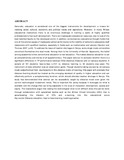| dc.description.abstract | Generally, education is considered one of the biggest instruments for development; a means for realizing social, cultural, economic and political needs and aspirations. However, in many African educational institutions there is an enormous challenge in training a cadre of highly qualified professionals to fuel such development. There are inadequate educational resources, due to loss of the best talented faculty to the developed world. In addition, contemporary educational thought holds that one of the
pivotal causes of inadequate school performance is the inability of schools to adequately staff classrooms with qualified teachers, especially in fields such as mathematics and science (Gordon and Thomas, 2007, p.43). To address the issue of teacher shortages in Kenya, some single mode universities converted themselves into dual-mode. Among them is the University of Nairobi. Apparently, the belief among academics is that
conventional education is real education. This makes distance education to act as complementary and worse of all supplementary. This paper sets out to compare whether there is a significant difference in TP performance between B.Ed (Science) Distance and on-campus students. A sample of 181 students: face-to-face n=131 vs. distance learning n= 50 students was used. The instrument of data collection was an observation guide. Though students taking courses by on-campus mode outperformed
their counterparts in the distance mode of learning, this paper will conclude that distance learning should be treated as the emerging standard of quality in higher education and can effectively perform a complementary function, which should alleviate teacher shortage in Kenya. This study has demonstrated that science can be successfully taught by distance mode even given the current technological investment levels. This is important for policy because it leverages on what is available and the change that can bring especially in the area of manpower development, access and equity. The researchers argue that raising the technological level is not difficult since this can be done through collaboration with specialized bodies such as the African Virtual University (AVU) that is spearheading the infusion of ICTs and e-learning into the educational arena
Key words: Distance education, face-to-face learning, teaching practice | en_US |

